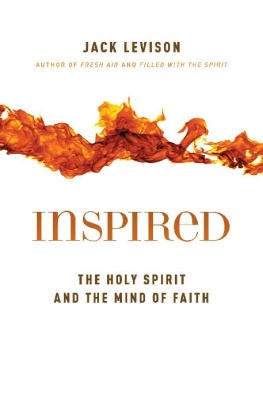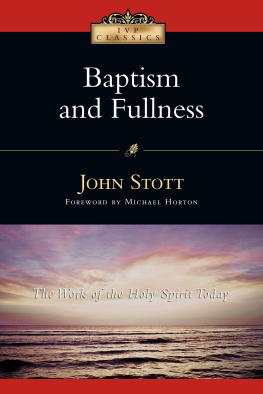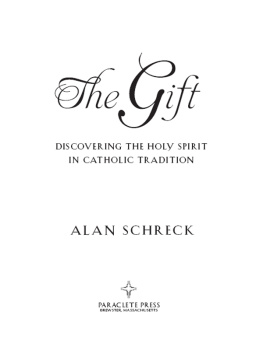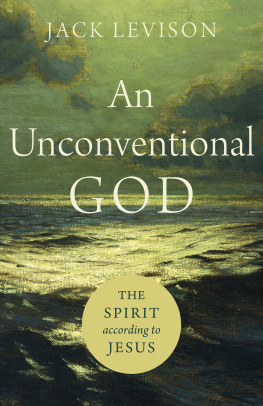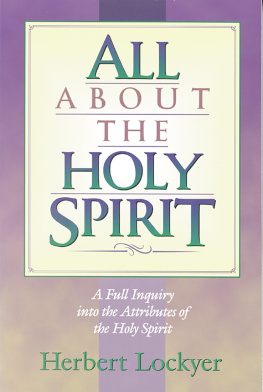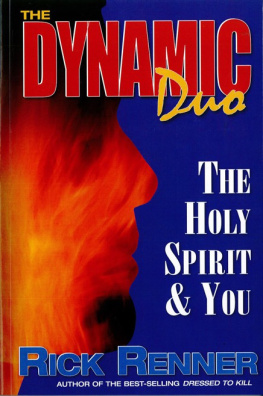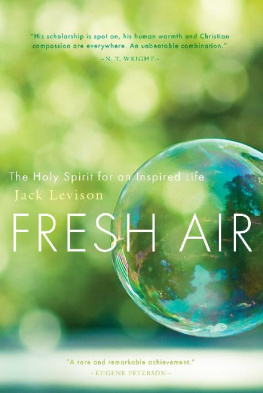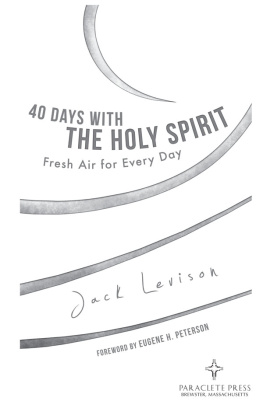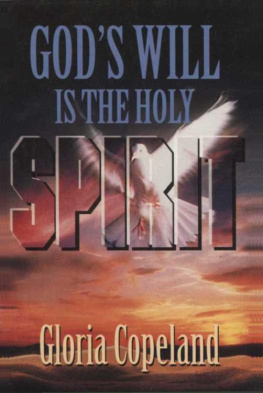Inspired
The Holy Spirit
and the Mind of Faith
Jack Levison
William B. Eerdmans Publishing Company
Grand Rapids, Michigan / Cambridge, U.K.
2013 Jack Levison
All rights reserved
Published 2013 by
Wm. B. Eerdmans Publishing Co.
2140 Oak Industrial Drive N.E., Grand Rapids, Michigan 49505 /
P.O. Box 163, Cambridge CB3 9PU U.K.
Printed in the United States of America1
Library of Congress Cataloging-in-Publication Data
Levison, John R.
Inspired: the Holy Spirit and the mind of faith / Jack Levison.
pages cm
Includes bibliographical references and index.
ISBN 978-0-8028-6788-9 (pbk.: alk. paper)
eISBN 978-1-4674-3905-3 (ePub)
eISBN 978-1-4674-3864-3 (Kindle)
1. Holy Spirit. 2. Bible Inspiration.
3. Bible Criticism, interpretation, etc.
4. Gunkel, Hermann, 1862-1932. Influence of the Holy Spirit.
I. Title.
BT123.L48 2013
231.3 dc23
2013025783
www.eerdmans.com
A line will take us hours maybe Yeats
To David Laskin
my dear friend
in whose company I while away the hours
Contents
During two decades of research and writing on pneumatology, I have been the fortunate beneficiary of generous institutions and individuals. The Alexander von Humboldt Foundation supported my first leave in Germany in 1993-94, during which time I completed The Spirit in First Century Judaism under the sponsorship of Professor Martin Hengel, of Eberhard-Karls-Universitt Tbingen. In 2005-06, a renewal of that initial grant, combined with a sabbatical leave from Seattle Pacific University, gave me time to revise Filled with the Spirit, as well as easy access to the ample resources of Ludwig-Maximilians-Universitt Mnchen and an apartment in the heart of Munichs university district in the Internationales Begegnungszentrum. The Louisville Institute, in 2008, granted me a summer stipend that allowed me to work on Fresh Air: The Holy Spirit for an Inspired Life. Finally, Seattle Pacific University funded a sabbatical last year. I read theologies I would not otherwise have had time to read in the normal course of life, as I scratched and clawed away at what I hoped would be a provocative and programmatic agenda for the future of pneumatologyalmost a small book in itself.
During my stay in Munich, Professor Jrg Frey and I developed the idea for an interdisciplinary, international research project, The Historical Roots of the Holy Spirit. Matching grants for this research from the TransCoop Program of the Alexander von Humboldt Foundation and the Shohet Scholars Program of the International Catacomb Society made month-long visits to Munich possible in 2010 and 2012. My family and I again stayed in the Internationales Begegnungszentrum. During those stays I had an office in the Protestant Faculty, with entre to library resources and the opportunity to have meaningful conversations, typically over coffee and pastries, with Professor Frey and, during the second stay, Professor Loren Stuckenbruck as well, even though his office was still packed head-height with boxes of books.
Three other colleagues have left their imprint on this book. Ron Herms read the entire manuscript, offered insightful comments, and raised important questions. Daniel Castelo, my colleague at Seattle Pacific University, taught me about sin over meatball heroes. Let me rephrase that. Daniel read the conclusion and challenged me to incorporate more on the reality of sin in the pneumatological agenda I have proposed. From across the continent, John R. Sachs navigated me through the pneumatology of Karl Rahner.
I am indebted as well to the good people at Eerdmans. Before the ink was dry on Filled with the Spirit, Michael Thomson encouraged me to write a second book for Eerdmans on the subject of the holy spirit. Filled with the Spirit exceeded five-hundred pages, and in it I was reluctant to draw conclusions for the church. Inspired: The Holy Spirit and the Mind of Faith contains a far more straightforward message for the church, going so far as to offer an agenda for the future of pneumatology in less than half the length of Filled with the Spirit. Vicky Fanning, of Eerdmans, is a terrific point person, while Jenny Hoffman, and my capable copy-editor David Cottingham, worked hard to minimize literary infelicities. Eerdmanss creative director, Willem Mineur, enlisted Kevin van der Leek to design a cover. I am delighted by the design. Eerdmans got the cover just right.
When it came time to prepare the indexes, I knew exactly whom to consult. Shannon Smythe, who recently completed her doctorate in theology at Princeton Theological Seminary, had compiled indexes for Filled with the Spirit, thanks to a research grant from Seattle Pacific University. Without hesitation I turned to Shannon for this book. She has, once again, done a remarkable job.
During the last few years, I have had countless conversations with my dear friend and accomplished author, David Laskin, about all things literary. David writes books people want to read, and he has coached me, time and again, on the art of writing to be read.
My children, Chloe and Jeremy, happily came along for the ride, even when trips to Munich were less than convenient. Last summer, for instance, Chloe and Jeremy met in New York and flew together to Munich, where we met them, Bavarian pretzels in hand. That night, exhausted, they made a long trek on foot without complaint to a beer garden outside of Munich to celebrate my birthday.
Finally, my muse: Priscilla Pope-Levison, an extraordinary blend of wife, colleague, friend, critic, and editor. I trust Priscillas judgments implicitly. While writing her own book, Building the Old Time Religion, for NYU Press, Priscilla engaged mine at every level. Yet to portray Priscilla as editor or author is too clinical. She is more than my colleague, more than my critic, more than my editor. I cherish Priscilla and have now for over thirty years from our chats over morning tea to the moment she lays her head on my shoulder at days end.
Somewhere between writing Filled with the Spirit for a scholarly readership and Fresh Air: The Holy Spirit for an Inspired Life for a popular one, I became aware of this conviction in the early church: the holy spirit becomes particularly present in the inspired interpretation of scripture.
By drawing a line in the sand between speaking in tongues and the inspired interpretation of scripture, I may have misled you. It took me only a short paragraph to do so an indication of how intractable dichotomies can be. So let me offer this corrective. I do not mean to drive a wedge between glossolalia and the inspired interpretation of scripture. I mean instead to posit that the early church Jewish and many Israelite authors too discovered a rich symbiosis between various experiences akin to ecstasy and inspired intellectual acuity. In this synergy of intellect and inspiration, we discover the genius of early Jewish and Christian conceptions of the spirit. Discovering that genius and unearthing enough examples to convince you of this symbiosis is the heart and soul of this book.
The lions share of this book consists of exegesis. I will lay out, with as much clarity and concision as I can muster, data from the literary corpora of Israel (i.e., the Jewish Bible or Old Testament), early Judaism (roughly 200 bce through 100 ce ), and the early church (i.e., the New Testament).
I also intend to create a bold agenda that will determine how the spiritualities of contemporary Christians can flourish when informed by a rich array of enduring and overlooked insights from Israelite, Jewish, and Christian antiquity. Readers keen to develop and sustain vibrant contemporary spiritualities will discover ample resources in this book.
This book is a combination of historical description and contemporary prescription, of rigorous exegesis and an unapologetic effort to provide a vital basis for contemporary spiritualities, particularly Christian ones, with which I am best acquainted. It represents the belief that scholarship and the church benefit from a taut relationship. On the practical level of how this book is laid out, historians and biblical scholars receive their due in the central section of each chapter, while pastors and theologians, both seasoned and budding, receive their due at the beginning and end of each chapter. Let me emphasize, however, that exegesis and contemporary relevance are indispensable to one another. I would urge you, therefore, whatever your particular interest in this book historical or contemporary to keep an eye open for the dimension that interests you least. You may be surprised by what you inadvertently encounter.
Next page
